Hundreds of thousands of civilians remain trapped in Ukrainian cities, sheltering from Russian air raids and shelling as talks between Ukraine and Russia's foreign ministers made little apparent progress.
With Russian President Vladimir Putin's war in Ukraine entering its third week, officials in Mariupol said Russian warplanes again bombed the encircled southern port city where a maternity hospital was bombed on Wednesday.
Ukrainian President Volodymyr Zelensky said Ukrainian authorities had managed to evacuate almost 40,000 people from the cities of Sumy, Trostyanets, Krasnopillya, Irpin, Bucha, Hostomel and Izyum, but Deputy Prime Minister Iryna Vereshchuk said not a single civilian was able to leave Mariupol today as Russian forces failed to respect a temporary ceasefire to allow evacuations.
Efforts to send food, water and medicine into the city failed when Russian tanks attacked a humanitarian corridor, Mr Zelenskiy said.
"This is outright terror ... from experienced terrorists," he said in a televised address.
Russia's defence ministry said earlier that it would declare a ceasefire on Friday and open humanitarian corridors from Mariupol as well as Kyiv, Sumy, Kharkiv, Mariupol and Chernihiv.
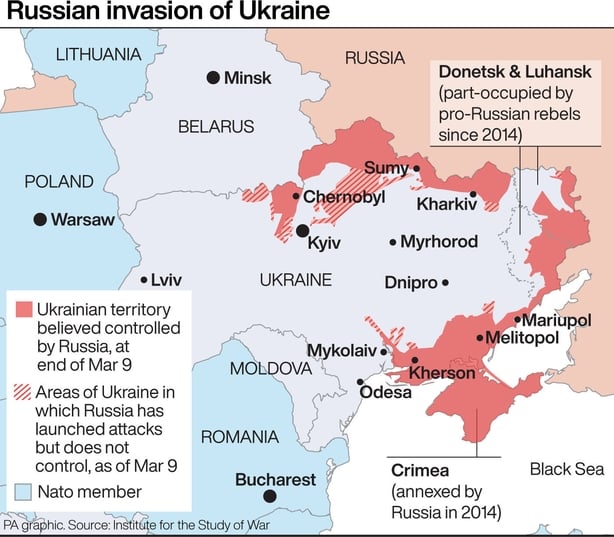
Russia's invasion of Ukraine has so far failed to reach its stated objectives, but has caused thousands of deaths and forced more than 2 million people to flee Ukraine, where several cities are under siege.
It has also hit the world's economy, still emerging from the effects of the coronavirus pandemic.
International Monetary Fund Managing Director Kristalina Georgieva said the war and the massive sanctions imposed on Russia as punishment have triggered a contraction in global trade and sent food and energy prices sharply higher, which will force the IMF to lower its global growth forecast next month.
She said she expected mounting pressure on Russia to end the war, given the spillover effects it is having on economies globally.
Putin, facing global condemnation and increasingly isolated, said Russia would emerge stronger after overcoming the difficulties caused by the sanctions.
He told a government meeting there had been no alternative to what Russia calls its special military operation in Ukraine.
"There are some questions, problems and difficulties but in the past, we have overcome them and we will overcome them," he said.
No breakthrough
Russian Foreign Minister Sergei Lavrov and Ukraine's Dmytro Kuleba met in Turkey in the highest-level talks since Putin ordered the invasion on 24 February.
Mr Kuleba said afterwards that Lavrov had refused to promise to hold fire to allow for the distribution of aid and for the evacuation along humanitarian corridors of hundreds of thousands of civilians trapped in Mariupol and elsewhere.
Lavrov showed no sign of making any concessions, saying the operation was going to plan and repeating Moscow's accusations that Ukraine posed a threat to Russia.
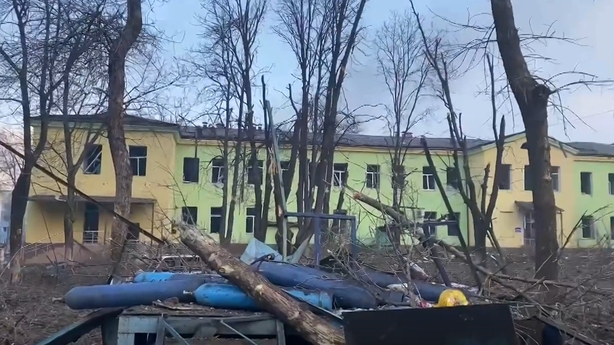
A ceasefire was not meant to be on the agenda today's talks in Antalya, Lavrov added.
Aid agencies say humanitarian help is most urgently needed in Mariupol, where residents are running out of food, water and power. Its capture would allow Russia to link up pro-Moscow enclaves in the east and Russian-annexed Crimea to the south.
Attempts to send aid and evacuation convoys have failed for six days.
Russian warplanes are targeting convoy routes, said an adviser to Mariupol's mayor.
"Air strikes started from the early morning. Air strike after air strike. All the historic centre is under bombardment," the adviser told Reuters by phone.
"They want to absolutely delete our city, delete our people. They want to stop any evacuation."
Lavrov said the hospital struck yesterday had stopped treating patients and had been occupied by Ukrainian "radicals".
Russia's Defence Ministry later denied having bombed the hospital, accusing Ukraine of a "staged provocation" there.
In Brussels, European Commission President Ursula von der Leyen said the hospital attack could constitute a war crime and should be investigated, calling it "inhumane, cruel and tragic".
Lavrov accused Western countries of inflaming the situation by arming Ukraine.
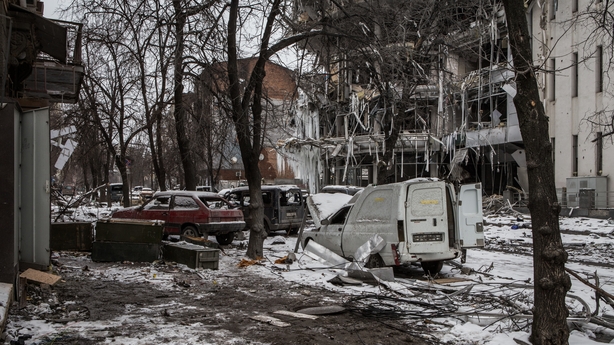
Asked if the conflict could lead to nuclear war, he said: "I don't want to believe, and I do not believe, that a nuclear war could start."
Russia says its offensive is aimed at disarming its neighbour and dislodging leaders it calls neo-Nazis. Kyiv and its Western allies say this is a baseless pretext to invade a democratic country of 44 million people.
But so far, Russian forces have failed to crush Ukraine's military, while Mr Zelensky - still in the capital Kyiv - has rallied his people and Western military aid has poured across the Polish and Romanian borders.
Russian troops have advanced in the south but have yet to capture a city in the north or east. Western countries believe that after a planned lightning strike on Kyiv failed in the early days of the war, Moscow has turned to tactics involving far more destructive assaults.
Britain has said a Russian column northwest of Kyiv has made little progress in over a week and was suffering losses.
In Washington, CIA (Central Intelligence Agency) director William Burns said Putin did not appear to have a "sustainable" end-game in Ukraine and might soon try to find a way to end the fighting.
Meanwhile, the Western-led sanctions designed to cut off the Russian economy and government from international markets have bitten hard, with the rouble plunging.
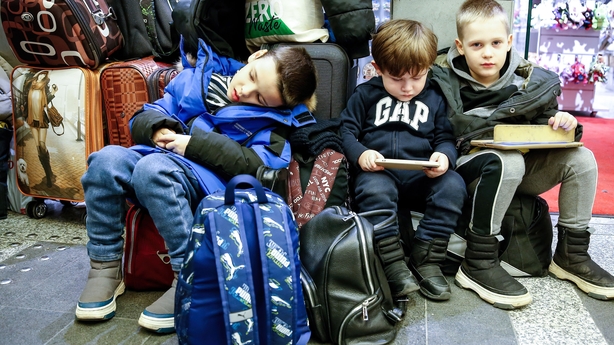
Goldman Sachs Group Inc GS.N said it was closing its Russian business - the first major US bank to exit. It follows decisions by such emblematic global brands as McDonald's, Starbucks and Coca-Cola to halt business in Russia.
'Barbaric'
The pounding of Mariupol underscored US warnings that the biggest assault on a European state since 1945 could become increasingly attritional after Russia's early setbacks.
Russia has repeatedly pledged since Saturday to halt firing so at least some trapped civilians could escape Mariupol. Both sides have blamed the other for the failure of the evacuations.
Half of the more than 2 million total refugees from Ukraine are children. The International Committee of the Red Cross said houses had been destroyed all across Ukraine.
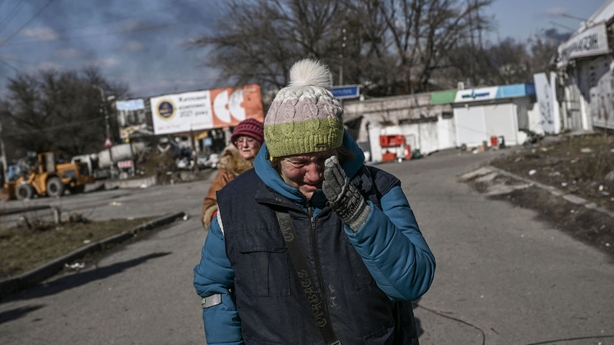
Survivors of the worst-hit cities are among the refugees, many suffering physical injuries and psychological trauma.
At the Polish border, Valera, a carpenter in his 50s, looked on nervously as his daughter Anna, 24, was borne on a stretcher.
It was two days since they had left the eastern city of Kharkiv, where Anna, who has cerebral palsy, broke her leg as they ran to a bomb shelter.
"There is positional fighting during the day, air raids in the evenings, they are shelling from everything, fighter aircraft," he said.
"The centre (of Kharkiv) is ruined, the outskirts have already been bombed."
He was one of few men to cross from Ukraine as those of conscription age are generally obliged to stay.
Mr Zelensky's chief economic adviser said Russian forces had so far destroyed at least $100 billion worth of Ukrainian infrastructure, buildings and other physical assets.
The war has caused 50% of Ukrainian businesses to shut down completely, while the other half are operating at well below capacity, Oleg Ustenko told an online event.
Meanwhile, the United Nations Security Council will convene tomorrow at Russia's request, diplomats said, to discuss Moscow's claims, presented without evidence, of US biological activities in Ukraine.
The United States has dismissed Russian claims as 'laughable,' warning Moscow may be preparing to use chemical or biological weapons.
